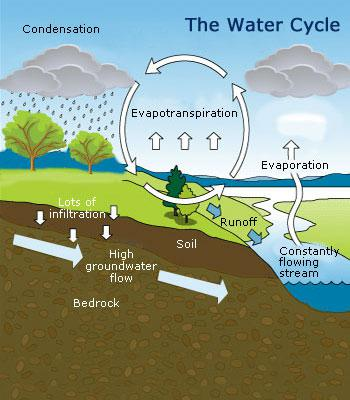
Explain the water cycle with a neat labeled diagram.
Answer
521.3k+ views
Hint Water is the most important and precious blessing of nature to our planet Earth. It cannot be created or destroyed. The water on the earth today is the same water that existed thousands of years ago and will continue to exist likewise in the future as well.

Step by step solutionThe water cycle is a Biogeochemical Cycle involved in the flow or circulation of water consisting of different levels of the environment. The water cycle can be defined as a natural process of constantly and repeatedly recycling the water in the atmosphere. It is also called the hydrological cycle or the hydrologic cycle.
When the water cycle is being processed between the earth and the atmosphere, water transforms into three states of matter that are solid, liquid, and gas.
The complete water cycle is figured in the form of four significant stages which are as follows: Evaporation, Condensation, Precipitation, and Collection.
1. Evaporation-This is the very primary stage of the water cycle. The process through which water from its liquid state changes to vapor, which is a gaseous state, is known as evaporation. During the water cycle, water in the water bodies gets heated up and therefore evaporates in the form of vapor, mashes with the air, and disappears with time.
2. Condensation-It is known as the second crucial step in the water cycle. After the evaporated water vapor loses its thermal energy, it forms liquid by the process of condensation.
Clouds are also formed with the process of condensation.
3. Precipitation-Rain, snow, sleet, frost, or hail are all examples of Precipitation. After the condensation, atmospheric water vapor turns into big water droplets and falls back to the earth with the help of gravity.
4. Deposition or Collection-This is the final and complete stage of the water cycle. The process of deposition occurs when evaporated water vapor falls back to earth in the form of precipitation. This water may fall back into different water bodies, like oceans, rivers, ponds, lakes, and even end up on the land, which then becomes a part of the groundwater.
Note Overall, the water cycle process describes how water is balanced in the atmosphere. It also plays an important role in ensuring the availability of water for all living organisms and also it has a great impact on our environment.

Step by step solutionThe water cycle is a Biogeochemical Cycle involved in the flow or circulation of water consisting of different levels of the environment. The water cycle can be defined as a natural process of constantly and repeatedly recycling the water in the atmosphere. It is also called the hydrological cycle or the hydrologic cycle.
When the water cycle is being processed between the earth and the atmosphere, water transforms into three states of matter that are solid, liquid, and gas.
The complete water cycle is figured in the form of four significant stages which are as follows: Evaporation, Condensation, Precipitation, and Collection.
1. Evaporation-This is the very primary stage of the water cycle. The process through which water from its liquid state changes to vapor, which is a gaseous state, is known as evaporation. During the water cycle, water in the water bodies gets heated up and therefore evaporates in the form of vapor, mashes with the air, and disappears with time.
2. Condensation-It is known as the second crucial step in the water cycle. After the evaporated water vapor loses its thermal energy, it forms liquid by the process of condensation.
Clouds are also formed with the process of condensation.
3. Precipitation-Rain, snow, sleet, frost, or hail are all examples of Precipitation. After the condensation, atmospheric water vapor turns into big water droplets and falls back to the earth with the help of gravity.
4. Deposition or Collection-This is the final and complete stage of the water cycle. The process of deposition occurs when evaporated water vapor falls back to earth in the form of precipitation. This water may fall back into different water bodies, like oceans, rivers, ponds, lakes, and even end up on the land, which then becomes a part of the groundwater.
Note Overall, the water cycle process describes how water is balanced in the atmosphere. It also plays an important role in ensuring the availability of water for all living organisms and also it has a great impact on our environment.
Recently Updated Pages
Master Class 7 English: Engaging Questions & Answers for Success

Master Class 7 Maths: Engaging Questions & Answers for Success

Master Class 7 Science: Engaging Questions & Answers for Success

Class 7 Question and Answer - Your Ultimate Solutions Guide

Master Class 9 General Knowledge: Engaging Questions & Answers for Success

Master Class 9 Social Science: Engaging Questions & Answers for Success

Trending doubts
The value of 6 more than 7 is A 1 B 1 C 13 D 13 class 7 maths CBSE

Convert 200 Million dollars in rupees class 7 maths CBSE

List of coprime numbers from 1 to 100 class 7 maths CBSE

AIM To prepare stained temporary mount of onion peel class 7 biology CBSE

The plural of Chief is Chieves A True B False class 7 english CBSE

Write a letter to the editor of the national daily class 7 english CBSE





